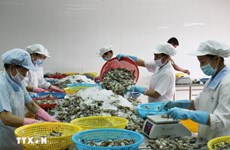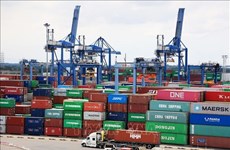Vietnam’s real estate signals recovery
Vietnam’s property market has shown signs of recovery after a long
period of stagnation, heard a symposium held in Ho Chi Minh City on
September 11.
Vietnam’s property market has shown signs of recovery after a long
period of stagnation, heard a symposium held in Ho Chi Minh City on
September 11.
Speaking at the "Vietnam Real Estate Symposium, 20 years looking back and two years looking forward" symposium", Nguyen Tran Nam, Deputy Minister of Construction, said that property prices had not increased and were now selling at reasonable prices, especially in the mid-range housing segment.
As for the high-end market, the prices of property projects in the western area of Hanoi fell dramatically, by 60 percent from 2011-2013. For the first half of the year, prices remained stable, with some project prices increasing by 1-2 percent only.
The number of transactions had gone up as well, he said. Around 5,100 transactions were completed in Hanoi in the first seven months of the year, or double the figure over the same period last year.
In HCM City, there were 4,500 transactions in the first seven months, a rise of 30 percent compared to the same period last year. As of August 20, the total value of real estate inventory was 82.295 trillion VND (3.9 billion USD), a drop of 46.254 trillion VND (2.2 billion USD) compared to the first quarter of last year. From December 31, 2013 to June 30, 2014, the total credit balance for property had increased by 7.7 percent to reach 282.2 trillion VND (13.3 billion USD). At least 20 percent of the government's housing credit package worth 30 trillion VND (1.4 billion USD) had been disbursed.
The property market has attracted a large amount of foreign direct investment (FDI). There are a total of 427 FDI property projects in the country, with total registered capital of 51 billion USD, ranking second after the processing industry.
Foreign direct investment in the real estate market accounts for 21 percent of total FDI in Vietnam. According to Savills Vietnam, the office-for-lease segment grew by 1.6 to 5 percent in most big cities in Asia Pacific, including Hanoi and HCM City, in the first half of the year.
Troy Griffiths, Deputy Managing Director of Savills Vietnam, said Vietnam's property leasing prices were competitive compared to other countries in the region, especially in the hotel, retail and serviced apartment segments.
Marc Townsend, Managing Director of CBRE Vietnam, said that HCM City and Hanoi were still the top target markets for property retailers.
Experts who spoke at the meeting said that high-end projects of a large scale were still the primary focus of developers.
However, only 20 percent of consumers can afford property in this segment, they said. Also, many property investors have to rely on short-term loans with high interest rates, while many small businesses that have weak financial capacity continue to take part in the market.
The country now has 15,316 property businesses. Of that number, 8,603 businesses have chartered capital of less than 20 billion VND (944,000 USD).
At the meeting, many foreign investors expressed concerns about lack of transparency and complicated administrative procedures in the real estate market.
They said a more open investment environment should be created.
To resolve these issues, the Vietnamese Government has issued many policies and incentives to ensure sustainable development of the market.
These include measures to control supply-demand balance; review and evaluation of projects; resolution of non-performing loans; and more loans to customers so they can buy houses.
The Ministry of Construction has also advised the Government to amend real estate business laws and housing laws with content that provides more favourable conditions to foreign businesses and foreigners to invest in real estate as well as rent and lease houses and land in Vietnam.
The symposium, held by the Australia Chamber of Commerce in Vietnam (Auscham), aimed to discuss the latest development in Vietnam's property sector, market insights, advice on attracting local and foreign investors, an upgrade on Law and Tax changes, and networking opportunities with key parties and well-known figures in the real estate industry.-VNA
Speaking at the "Vietnam Real Estate Symposium, 20 years looking back and two years looking forward" symposium", Nguyen Tran Nam, Deputy Minister of Construction, said that property prices had not increased and were now selling at reasonable prices, especially in the mid-range housing segment.
As for the high-end market, the prices of property projects in the western area of Hanoi fell dramatically, by 60 percent from 2011-2013. For the first half of the year, prices remained stable, with some project prices increasing by 1-2 percent only.
The number of transactions had gone up as well, he said. Around 5,100 transactions were completed in Hanoi in the first seven months of the year, or double the figure over the same period last year.
In HCM City, there were 4,500 transactions in the first seven months, a rise of 30 percent compared to the same period last year. As of August 20, the total value of real estate inventory was 82.295 trillion VND (3.9 billion USD), a drop of 46.254 trillion VND (2.2 billion USD) compared to the first quarter of last year. From December 31, 2013 to June 30, 2014, the total credit balance for property had increased by 7.7 percent to reach 282.2 trillion VND (13.3 billion USD). At least 20 percent of the government's housing credit package worth 30 trillion VND (1.4 billion USD) had been disbursed.
The property market has attracted a large amount of foreign direct investment (FDI). There are a total of 427 FDI property projects in the country, with total registered capital of 51 billion USD, ranking second after the processing industry.
Foreign direct investment in the real estate market accounts for 21 percent of total FDI in Vietnam. According to Savills Vietnam, the office-for-lease segment grew by 1.6 to 5 percent in most big cities in Asia Pacific, including Hanoi and HCM City, in the first half of the year.
Troy Griffiths, Deputy Managing Director of Savills Vietnam, said Vietnam's property leasing prices were competitive compared to other countries in the region, especially in the hotel, retail and serviced apartment segments.
Marc Townsend, Managing Director of CBRE Vietnam, said that HCM City and Hanoi were still the top target markets for property retailers.
Experts who spoke at the meeting said that high-end projects of a large scale were still the primary focus of developers.
However, only 20 percent of consumers can afford property in this segment, they said. Also, many property investors have to rely on short-term loans with high interest rates, while many small businesses that have weak financial capacity continue to take part in the market.
The country now has 15,316 property businesses. Of that number, 8,603 businesses have chartered capital of less than 20 billion VND (944,000 USD).
At the meeting, many foreign investors expressed concerns about lack of transparency and complicated administrative procedures in the real estate market.
They said a more open investment environment should be created.
To resolve these issues, the Vietnamese Government has issued many policies and incentives to ensure sustainable development of the market.
These include measures to control supply-demand balance; review and evaluation of projects; resolution of non-performing loans; and more loans to customers so they can buy houses.
The Ministry of Construction has also advised the Government to amend real estate business laws and housing laws with content that provides more favourable conditions to foreign businesses and foreigners to invest in real estate as well as rent and lease houses and land in Vietnam.
The symposium, held by the Australia Chamber of Commerce in Vietnam (Auscham), aimed to discuss the latest development in Vietnam's property sector, market insights, advice on attracting local and foreign investors, an upgrade on Law and Tax changes, and networking opportunities with key parties and well-known figures in the real estate industry.-VNA












